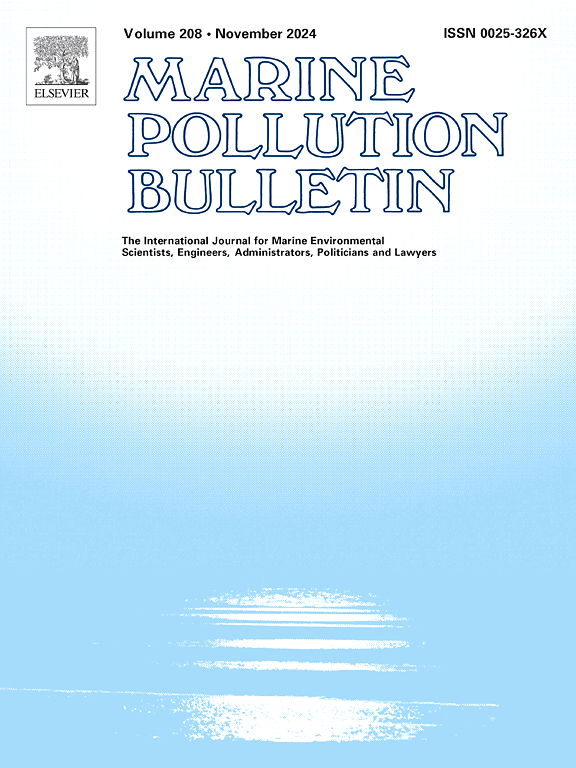超越分类学:一种功能方法揭示了珊瑚鱼对废水污染的反应模式
IF 4.9
3区 环境科学与生态学
Q1 ENVIRONMENTAL SCIENCES
引用次数: 0
摘要
珊瑚礁面临着气候变化和废水污染等当地压力因素的严重威胁,这些因素严重影响了珊瑚礁生态系统,但仍未得到充分开发。珊瑚鱼对通过渔业支持人类生计和维持生态系统功能(如养分循环和藻类控制)至关重要。虽然大多数研究都集中在废水对底栖生物群落的影响上,但对其对珊瑚鱼生理、行为和群落结构的影响却知之甚少。很少有研究采用基于性状的方法来评价废水对鱼类生态作用的影响。本研究系统回顾了52篇论文,并对8项控制影响研究进行了荟萃分析,以评估废水对珊瑚鱼分类和功能结构的影响。基于分类学的指标揭示了不同的反应,研究报告了污染地点的丰度、丰富度和生物量的下降、增加或没有变化。功能分析提供了更清晰的模式:污染站点以中等营养水平的小而高恢复力物种为主,而控制站点在不同深度和营养水平上支持较大的低恢复力物种。对照位点的功能丰富度普遍较高。污染物的具体影响各不相同:沉积物损害了取食效率和生长,而养分富集通过有利于低营养水平而改变了物种组成。这些发现表明了基于分类学的指标的局限性,并突出了功能方法在检测早期生态系统退化方面的价值。将功能生态学与废水表征相结合可以增强对生态反应的预测,并支持有针对性的管理策略。本研究强调了解决废水污染的紧迫性,以保护对人类福祉至关重要的珊瑚礁生物多样性和生态系统服务。本文章由计算机程序翻译,如有差异,请以英文原文为准。

Beyond taxonomy: A functional approach reveals patterns of reef fish response to wastewater pollution
Coral reefs face severe threats from climate change and local stressors like wastewater pollution, which significantly impact reef ecosystems but remain underexplored. Reef fish are essential for supporting human livelihoods through fisheries and maintaining ecosystem functions such as nutrient cycling and algae control. While most research focuses on wastewater's effects on benthic communities, its impact on reef fish physiology, behavior, and community structure is poorly understood. Few studies apply trait-based approaches to evaluate wastewater's influence on fish's ecological roles. This study systematically reviews 52 papers and conducts a meta-analysis of eight control-impact studies to assess wastewater effects on reef fish taxonomic and functional structure. Taxonomy-based metrics revealed mixed responses, with studies reporting declines, increases, or no changes in abundance, richness, and biomass in polluted sites. Functional analysis provided clearer patterns: polluted sites were dominated by smaller, high-resilience species at mid-trophic levels, while control sites supported larger, low-resilience species at diverse depths and trophic levels. Functional richness was generally higher in control sites. Pollutant-specific effects varied: sediments impaired feeding efficiency and growth, while nutrient enrichment shifted species composition by favoring lower trophic levels. These findings demonstrate the limitations of taxonomy-based metrics and highlight the value of functional approaches for detecting early ecosystem degradation. Integrating functional ecology with wastewater characterization enhances predictions of ecological responses and supports targeted management strategies. This research emphasizes the urgency of addressing wastewater pollution to safeguard reef biodiversity and ecosystem services critical to human well-being.
求助全文
通过发布文献求助,成功后即可免费获取论文全文。
去求助
来源期刊

Marine pollution bulletin
环境科学-海洋与淡水生物学
CiteScore
10.20
自引率
15.50%
发文量
1077
审稿时长
68 days
期刊介绍:
Marine Pollution Bulletin is concerned with the rational use of maritime and marine resources in estuaries, the seas and oceans, as well as with documenting marine pollution and introducing new forms of measurement and analysis. A wide range of topics are discussed as news, comment, reviews and research reports, not only on effluent disposal and pollution control, but also on the management, economic aspects and protection of the marine environment in general.
 求助内容:
求助内容: 应助结果提醒方式:
应助结果提醒方式:


